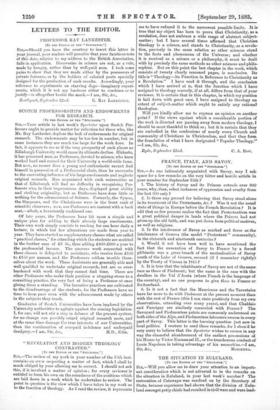FRANCE, ITALY, AND SAVOY.
[To THE EDITOR OP THE "SPECTATOR."]
Sin,—As one intimately acquainted with Savoy, may I ask space for a few remarks on the very bitter and hostile article in your number for September 15th ?
1. The history of Savoy and its Princes extends over 800' years, why, then, select instances of oppression and cruelty from the last 300 only ?
2. Is there any ground for believing that Savoy stood alone in its treatment of the Protestants, &c. ? Was it not the usual state of things in Europe before the French Revolution ? It is odd that so few persons realise the fact that Protestantism was a great political danger in lands where the Princes had not given up the old faith, and was put down from political motives, as well as religious.
3. Is the intolerance of Savoy as marked and fierce as the intolerance of Geneva (the model " Protestant " community),. in the sixteenth and nineteenth centuries ?
4. Would it not have been well to have mentioned the fact that the annexation of Savoy to France by a forced pl6biscite was a gross breach of the neutralisation of Savoy south of the Lake of Geneva, secured (if I remember rightly), by the Treaty of Vienna in 1815 ?
5. It is true that the inhabitants of Savoy are not of the same- race as those of Piedmont; but the same is the case with the dwellers in the Val d'Aosta (where French is the language of the country), and no one proposes to give them to France or Switzerland.
6. Is it not a fact that the Manrienne and the Tarentaise have far more to do with Piedmont at the present moment than with the rest of France (this I can state positively from my own observations, extending over many years), and that Chablais and Fancigny are similarly connected with France ? The Savoyard and Piedmontese patois are commonly understood on, both sides of the Alps, and Piedmontese labourers swarm in every part of Savoy. This latter is the burning question just now in local politics. I venture to send these remarks, for I shotil be very sorry to believe that the Spectator wishes to excuse in any way the shameful abandonment of the earliest possessions of his House by Victor Emmanuel II., or the treacherous conduct of Louis Napoleon in taking advantage of his necessities.—I am,


































 Previous page
Previous page